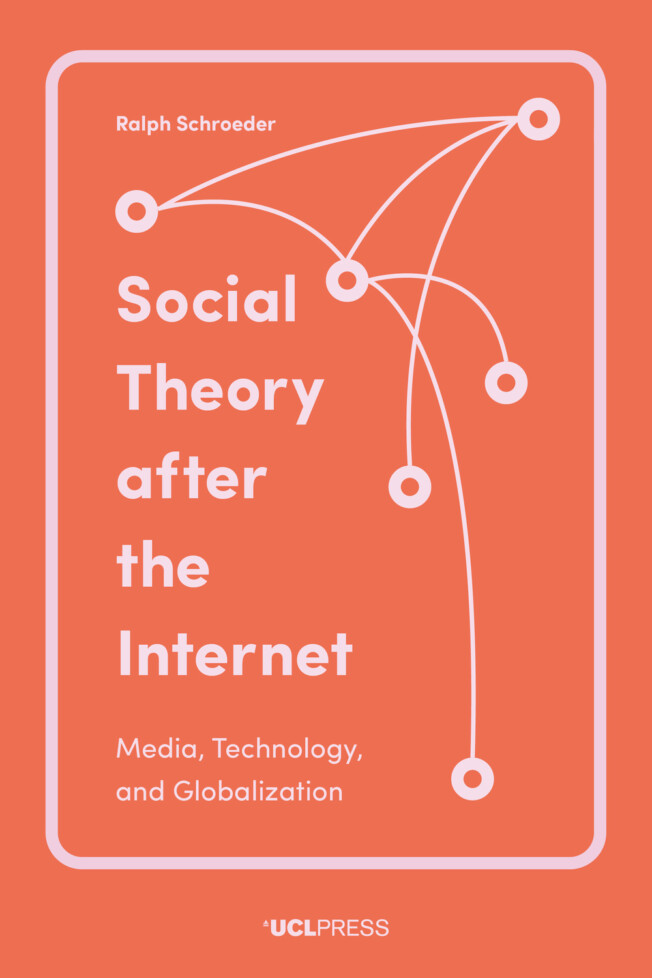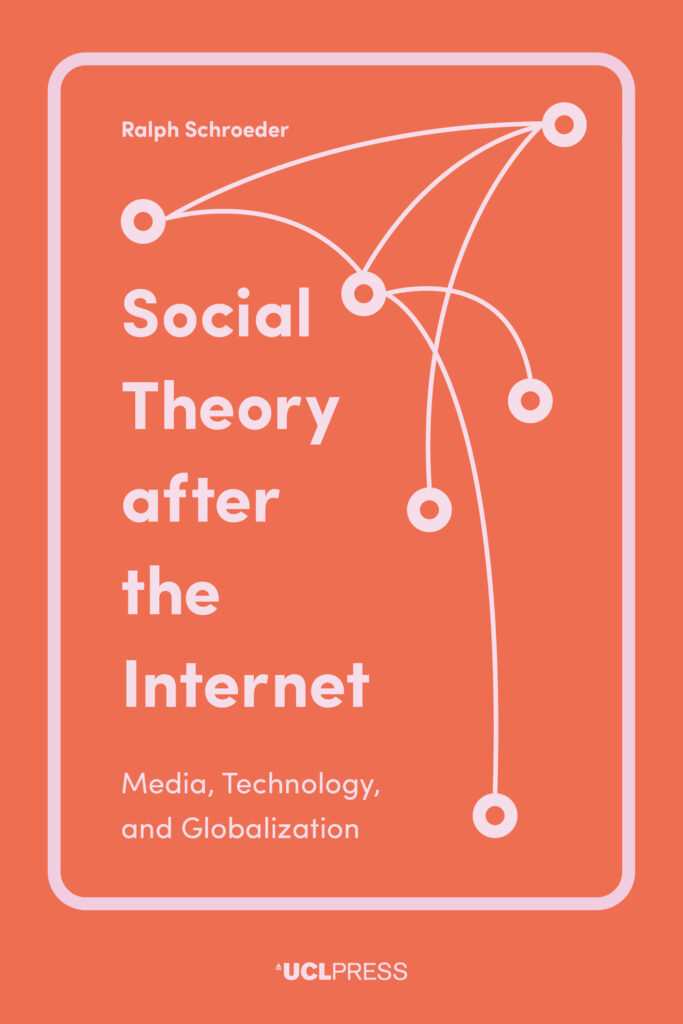
Social Theory after the Internet
Media, Technology, and Globalization
Ralph Schroeder (Author)
The internet has fundamentally transformed society in the past 25 years, yet existing theories of mass or interpersonal communication do not work well in understanding a digital world. Nor has this understanding been helped by disciplinary specialization and a continual focus on the latest innovations. Ralph Schroeder takes a longer-term view, synthesizing perspectives and findings from various social science disciplines in four countries: the United States, Sweden, India and China. His comparison highlights, among other observations, that smartphones are in many respects more important than PC-based internet uses.
Social Theory after the Internet focuses on everyday uses and effects of the internet, including information seeking and big data, and explains how the internet has gone beyond traditional media in, for example, enabling Donald Trump and Narendra Modi to come to power. Schroeder puts forward a sophisticated theory of the role internet plays, and how both technological and social forces shape its significance. He provides a sweeping and penetrating study, theoretically ambitious and at the same time always empirically grounded.
The book covers key contemporary debates in a clear and accessible way. It will be of great interest to students and scholars of digital media and society, the internet and politics, and the social implications of big data.
1. The internet in theory
1.1 Theories of media, new and old
1.2 Summary of the argument
1.3 The autonomy of the media (sub)system
1.4 The role of the media in politics, culture and the economy: separate and different
1.5 A limited attention space
1.6 Who’s afraid of technological determinism?
1.7 Chapter overview
2. Media systems, digital media and politics
2.1 Theories of digital media and politics
2.2 Media systems in Sweden and America
2.3 Digital media and politics in Sweden and America
2.4 Media systems in China and India
2.5 Digital media and politics in China and India
3. Digital media and the rise of right-wing populism
3.1 Trump’s ascent via Twitter
3.2 The Sweden Democrats’ alternative media
3.3 Modi’s religious nationalism on Twitter
3.4 Containing online nationalists in China
3.5 Prospects for mediated politics 78
4. The internet in everyday life I: sociability
4.1 Tethered togetherness
4.2 The spread of social media
4.3 Sociability and social divides
4.4 Visual co-presence
4.5 Alone or together?
4.6 Globalizing sociability
5. The internet in everyday life II: seeking information
5.1 A new information infrastructure
5.2 Seeking information
5.3 Search engine uses
5.4 Search engines as gatekeepers
5.5 Does Google shape what we know?
5.6 The Web of information
5.7 Is the Web global?
5.8 Wikipedia
5.9 Information seeking and gatekeeping
6. Big data: shaping knowledge, shaping everyday life
6.1 Defining big data
6.2 Advancing academic knowledge about digital media
6.3 The uses and limits of big data in the social sciences
6.4 Facebook’s ‘Brave New Worlds’
6.5 Targeting publics, and the uses and limits of big data in everyday life
6.6 Big data and policy in different media systems
7. Futures
7.1 Media, globalization, technology
7.2 The uses and limits of theory
7.3 Technological determinism revisited
7.4 Mediated politics
7.5 Information needs and an open culture of information
7.6 Big data and targeting
7.7 Digital versus traditional media
7.8 Separate changes and limited impact
7.9 What is to be done?
DOI: 10.14324/111.9781787351226
Number of pages: 208
Number of illustrations: 2
Publication date: 04 January 2018
PDF ISBN: 9781787351226
EPUB ISBN: 9781787351257
Read Online ISBN: 9781787351271
Hardback ISBN: 9781787351240
Paperback ISBN: 9781787351233
Ralph Schroeder (Author)
Ralph Schroeder is a Professor at the Oxford Internet Institute. Before coming to Oxford University, he was Professor at Chalmers University in Gothenburg. His recent books are Rethinking Science, Technology and Social Change (2007) and, co-authored with Eric T. Meyer, Knowledge Machines: Digital Transformations of the Sciences and Humanities (2015).
‘A highly ambitious contribution that allows us to take a step back and to systematically think of digital media’s contribution to social change in different social systems and its boundedness on country-specific contexts…. Schroeder’s book is a highly valuable addition to the literature.’
The International Journal of Press/Politics
‘Schroeder reveals some interesting facts concerning interaction with content posted on social media [in] Tethered togetherness, The spread of social media, Sociability and social divides, Visual copresence, Alone or together and Globalizing sociability.’
Medijske Studije
Related titles
The Global Smartphone
Daniel Miller, Laila Abed Rabho, Patrick Awondo, Maya de Vries, Marília Duque, Pauline Garvey, Laura Haapio-Kirk, Charlotte Hawkins, Alfonso Otaegui, Shireen Walton, Xinyuan Wang,
06 May 2021
Social Research for our Times
Claire Cameron, Alison Koslowski, Alison Lamont, Peter Moss,
06 November 2023
How the World Changed Social Media
Daniel Miller, Elisabetta Costa, Nell Haynes, Tom McDonald, Razvan Nicolescu, Jolynna Sinanan, Juliano Spyer, Shriram Venkatraman, Xinyuan Wang,
29 February 2016
Social Theory after the Internet
Media, Technology, and Globalization
The internet has fundamentally transformed society in the past 25 years, yet existing theories of mass or interpersonal communication do not work well in understanding a digital world. Nor has this understanding been helped by disciplinary specialization and a continual focus on the latest innovations. Ralph Schroeder takes a longer-term view, synthesizing perspectives and findings from various social science disciplines in four countries: the United States, Sweden, India and China. His comparison highlights, among other observations, that smartphones are in many respects more important than PC-based internet uses.
Social Theory after the Internet focuses on everyday uses and effects of the internet, including information seeking and big data, and explains how the internet has gone beyond traditional media in, for example, enabling Donald Trump and Narendra Modi to come to power. Schroeder puts forward a sophisticated theory of the role internet plays, and how both technological and social forces shape its significance. He provides a sweeping and penetrating study, theoretically ambitious and at the same time always empirically grounded.
The book covers key contemporary debates in a clear and accessible way. It will be of great interest to students and scholars of digital media and society, the internet and politics, and the social implications of big data.
‘A highly ambitious contribution that allows us to take a step back and to systematically think of digital media’s contribution to social change in different social systems and its boundedness on country-specific contexts…. Schroeder’s book is a highly valuable addition to the literature.’
The International Journal of Press/Politics
‘Schroeder reveals some interesting facts concerning interaction with content posted on social media [in] Tethered togetherness, The spread of social media, Sociability and social divides, Visual copresence, Alone or together and Globalizing sociability.’
Medijske Studije

